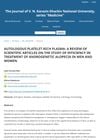Search
for
Sort by
Research
240-270 / 1000+ results
research Self-Amplifying RNA Approach for Protein Replacement Therapy
Self-amplifying RNA could be a better option for protein replacement therapy with lower doses and lasting effects, but delivering it into cells is still challenging.
research Exosomes Derived From Dermal Papilla Cells Mediate Hair Follicle Stem Cell Proliferation Through The Wnt3a/Beta-Catenin Signaling Pathway
Exosomes from dermal papilla cells help hair follicle stem cells grow and survive.

research Trends in Biopolymer Science Applied to Cosmetics
Biopolymers are increasingly used in cosmetics for their non-toxicity and skin benefits, with future biotech advancements likely to expand their applications.

research Female Pattern Hair Loss: An Overview with Focus on the Genetics
Different genes cause Female Pattern Hair Loss compared to male hair loss, and treatments vary, but more research is needed to understand it fully.

research A Small Scale Study to Evaluate the Efficacy of Microneedling With or Without Platelet-Rich Plasma in the Treatment of Post-Clipping Alopecia in Dogs
Microneedling with platelet-rich plasma helps dog hair regrow faster than microneedling alone.
research Prospective Observational Study of a Non-Arthroscopic Autologous Cartilage Micrografting Technology for Knee Osteoarthritis
AMT® is effective and safe for early-stage knee osteoarthritis.

research Autologous Platelet and Extracellular Vesicle-Rich Plasma as Therapeutic Fluid: A Review
Autologous Platelet and Extracellular Vesicle-Rich Plasma (PVRP) has potential in enhancing tissue regeneration and improving hair conditions, but its effectiveness varies due to individual differences.

research Therapeutic Potential of Adult Platelets and Cord Blood Platelets in Future Clinical Directions
Cord blood platelets may have promising future medical uses but need more research.

research Revealing Novel Insights on How Oral Supplementation With Collagen Peptides May Prevent Hair Loss: Lessons From the Human Hair Follicle Organ Culture
Collagen peptides from marine and bovine sources may help prevent hair loss by affecting hair follicle stem cells differently.

research Impact of Different Preparation Methods to Obtain Autologous Non-Activated Platelet-Rich Plasma and Activated Platelet-Rich Plasma in Plastic Surgery: Wound Healing and Hair Regrowth Evaluation
Different methods of preparing Platelet-Rich Plasma (PRP) can affect wound healing and hair regrowth in plastic surgery. Using a kit with specific standards helps isolate PRP that meets quality criteria. Non-Activated PRP and Activated PRP have varying effects depending on the tissue and condition treated. For hair regrowth, Non-Activated PRP increased hair density more than Activated PRP. Both treatments improved various aspects of scalp health.

research Autologous Platelet-Rich Plasma: A Review of Scientific Articles on the Study of Efficiency in Treatment of Androgenetic Alopecia in Men and Women
Platelet-rich plasma can positively affect common hair loss, but more research is needed for standard use.

research Efficacy of Autologous Platelet-Rich Plasma in the Treatment of Male Androgenetic Alopecia
Using your own blood (PRP) can effectively increase hair count and strength in men with hair loss.

research Platelet-Rich Plasma in Dermatology: Boon or Bane?
Platelet-rich plasma might help with hair growth and skin conditions, but more research is needed to prove its effectiveness and safety.

research A Comprehensive Review of Platelet-Rich Plasma for the Treatment of Dermatologic Disorders
Platelet-rich plasma can increase hair density and may help treat some skin conditions, but it's costly, not FDA-approved, and needs more research.

research Progress in the Use of Platelet-Rich Plasma in Aesthetic and Medical Dermatology
Platelet-rich plasma (PRP) is effective in treating various skin conditions and improving hair density, thickness, and patient satisfaction, with lower relapse rates for Alopecia Areata.

research A New Treatment for Androgenetic Alopecia: Platelet-Rich Plasma Injections
Platelet-rich plasma injections are a promising new treatment for hair loss, showing initial positive results.

research An Insight of Platelet Rich Plasma (PRP) Role in Dermatology: Review Article
Platelet Rich Plasma (PRP) helps in healing wounds and regenerating tissue, so dermatologists are using it more.

research Opening New Horizons in Regenerative Dermatology Using Platelet-Based Autologous Therapies
Platelet-based therapies using a patient's own blood show promise for skin and hair regeneration but require more research for confirmation.

research Current Concepts and Translational Uses of Platelet-Rich Plasma Biotechnology
Platelet Rich Plasma (PRP) shows promise for tissue repair and immune response, but more research is needed to fully understand it and optimize its use.

research Use of Platelet-Rich Plasma in the Management of Alopecia Areata
Platelet-Rich Plasma (PRP) may be a safe and effective treatment for hair loss caused by Alopecia Areata.
research Platelet-Rich Plasma as a Method of Treatment of Androgenetic Alopecia in Men: A Case Report
PRP mesotherapy can effectively treat male hair loss with minimal side effects.

research Therapies
The document concludes that low-dose acne treatment is most suitable for moderate acne, with high patient satisfaction and low relapse rates.

research AIRMESS – Academy of International Regenerative Medicine & Surgery Societies: Recommendations in the Use of Platelet-Rich Plasma (PRP) and Autologous Stem Cell-Based Therapy (ASC-BT) in Androgenetic Alopecia and Wound Healing
Use PRP and ASC-BT for hair loss and wound healing, but more research needed.

research Evaluation of the Effect of Autologous Platelet-Rich Plasma on Androgenic Alopecia
Using your own platelet-rich plasma (PRP) can effectively treat hair loss, increasing hair density and width with no side effects.

research The Effect of Autologous Activated Platelet Rich Plasma Injection on Pattern Hair Loss: Clinical and Histomorphometric Evaluation
AA-PRP injections effectively increase hair count and thickness for male pattern hair loss.

research A Randomized Blinded Retrospective Study: The Combined Use of Micro-Needling Technique, Low-Level Laser Therapy, and Autologous Non-Activated Platelet-Rich Plasma Improves Hair Re-Growth in Patients with Androgenic Alopecia
Using micro-needling, low-level laser therapy, and platelet-rich plasma together significantly improves hair growth in people with hair loss.

research Autologous Platelet-Rich Plasma as a Treatment for Male Androgenetic Alopecia: Study of 14 Cases
PRP injections may slightly improve hair density and count for male hair loss, but more research is needed.

research Safety and Efficacy of Microneedling with Autologous Platelet-Rich Plasma in Chronic and Stable Alopecia Areata
Microneedling with PRP is a safe and effective way to treat chronic alopecia areata, improving hair regrowth with minimal side effects.

research Use of Plasma Gel as Autologous Collagen Biostimulator with Simplified Technique: Case Report
Plasma gel and PRP treatments improve skin and hair with minimal side effects.